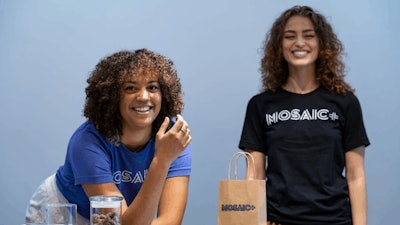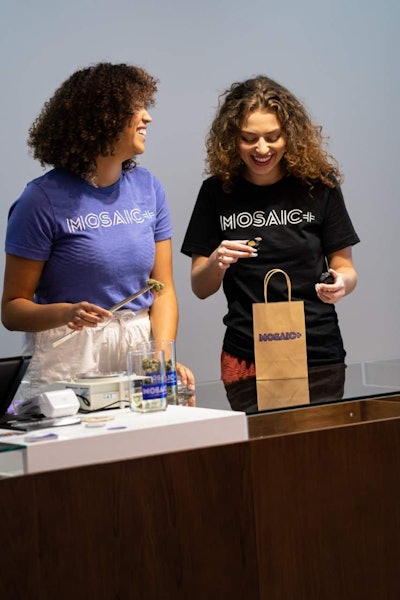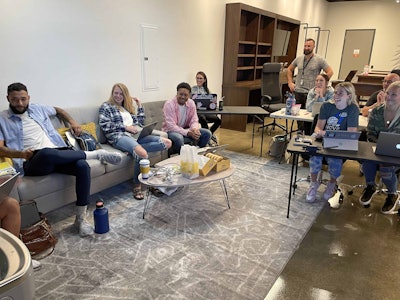
As their primary role is to assist customers and patients, budtenders are likely the people consumers interact with the most, inevitably making them the face of the business.
Budtenders help patients navigate the world of cannabis consumption by advising them of which products to use based on their specific needs or providing them with a comprehensive knowledge of cannabis, different products, dosing and much more.
Joseph Hendrix, chief financial officer of Resonant Cultivation and Mosaic+, an Oklahoma City medical cannabis dispensary, described budtenders as the "most direct connection that your organization has with its patients and customers," making it essential that dispensaries implement proper budtender training to ensure customers have a safe and enjoyable experience.
Cannabis Dispensary spoke with two industry professionals to explore the importance of budtender training and the best practices and techniques their dispensaries use in their training programs.
It Starts With the Patient
Corey Rimmel, operations manager at Feel State, a Missouri-based medical cannabis dispensary business, said one of the main things Feel State focuses on in its budtender training is the patient experience and how to offer excellent customer service.
"[We discuss] how to greet someone, how to sell an item, how to recognize social cues when talking with someone, and how to really get to know someone, learn something about them and make them feel welcome," Rimmel said.
One of Feel State's goals is for budtenders to have more extended conversations with customers and answer their questions. And the dispensary works to provide budtenders with the proper knowledge to have those in-depth conversations with customers, he said.
Hendrix also expressed Mosaic+'s passion for ensuring patients have a great in-store experience.
"The goal for us is [to create] that trusted experience, where a patient knows when they set foot in Mosaic+, they're going to walk out of there with a good experience [and] with quality products that they want and desire," Hendrix said. "And [our goal] is to have a fully trained team who really excels at delivering that experience to our customers."

© Courtesy of The Medicated Okies
Mosaic+ Budtenders: Nyomi Barrick (purple shirt) and Jaci Ledford (black shirt)
Mosaic+ does "mock transactions," where one team member will play the role of different patients, while new hires act as the budtender, Hendrix said. The idea is to prepare new team members on how to handle and approach patients differently.
"Maybe it's a patient who is new to cannabis or is reconnecting with cannabis, so they don't really know what they are looking for yet,” he said. “Or maybe it's somebody who is very familiar with cannabis and a true connoisseur and may, to a certain extent, know certain parts of the plant better than our team. So, how do we handle that approach? Or maybe it's dealing with a customer who's not pleased with something; how do we handle that?"
From there, the new hires observe and monitor "shift leads," or the "frontline trainers," who are assigned to be the first line of help at Mosaic+ for any questions that that one might have, Hendrix said.
Hendrix and Rimmel noted that while customer satisfaction is of the utmost importance to them, employees also need to be trained on various education topics to ensure they can properly meet patient's and customer's needs, answer their questions and educate them.
Education Training is Key
"I think it's the duty of the dispensary to be able to provide patients with education," Rimmel said. He explained that Feel State prioritizes cannabis education and science in its budtender training.
"We really try to give the employees as much information related to science and the products as they want," Rimmel said. "We have unlimited content, videos, tests, documents and people to talk to. So, we spend a lot of time on that."
Feel State budtenders go through a mix of online and in-person training, Rimmel said.
The dispensary puts its budtenders through a 10- to 12-chapter in-depth scientific course put together by one of its leading consultants, Emma Chasen, a cannabis educator and consultant at Eminent Consulting.

Feel State Budtender Training
"We have a lot of that content that she put together, and then a lot of other documents that we've written internally that kind of go over a lot of that," he said. "So, someone will read it, and then we'll discuss amongst the whole team. [Then] we'll ask, 'Are there any questions?' to make sure everyone's on the same page.
"Some stuff with the online training that's done at home, or while they're slow to shift. And then the reading and discussion part, that was all done at the store with all the employees in a circle or at a table."
While Feel State's budtender training typically only takes two to three weeks, Rimmel said, "it's a lifelong journey of learning cannabis.” The dispensary offers ongoing training, such as hosting Q & A's with senior-level employees, to allow budtenders to ask questions and refresh their memory as they pick up experience in the store.
And aside from general cannabis education, Hendrix said budtenders must understand the regulatory requirements related to their job and the industry.
"There are so many different parts of the knowledge base that everybody has to have," Hendrix said. "I think being in a highly regulated industry, compliance is going to be the first topic for everybody to understand, [such as] knowing the daily limits that one can purchase or possess at any given time or packaging requirements. So, having budtenders as kind of the eye on the ground too on the whole compliance side or having an education on that [is important]."
Enhance Product Knowledge
One of the most prominent things budtenders do is help customers and patients find products that best suit their needs.
Hendrix said Mosaic+ hosts bi-weekly or monthly product education sessions, where vendors come in for 30 minutes to an hour and discuss their company's product, mission, what makes their products different and more.
While it's not required, Mosaic+ encourages team members to come to meet the vendors and learn about their products more in-depth.
"It's an opportunity for you as a team member to learn from this patch maker or this edible company or this company that makes topicals to understand what's different about that product," he said. "That way, when we're giving our patients options, they know what to say and why that product may be different, or why this product may be better over that one."
Rimmel said Feel State puts cheat sheets and guides on each product to help budtenders learn about each one, but he believes product knowledge comes with time.
"I just think it takes a lot of interactions over and over again to experience the products and to really learn them," Rimmel said. "We are big on not so much choosing a product for a patient, but more telling them, 'Hey, you know, cannabis is something you need to experiment with."
And part of product knowledge is also understanding dosing.
"For a new customer, it's our responsibility for the patient and also for the industry, that the patient understands that sometimes when you start with an edible, tincture, flower, hash or whatever it might be, less is more," Hendrix said. "We advise patients to start small [because] you can always increase your dosages, and that's something that's really part of our curriculum."
Hendrix said Mosaic+ also trains its budtenders to ask several questions to understand how familiar a customer is with cannabis so they can appropriately guide them.
Rimmel expressed that Feel State uses a similar approach, where budtenders direct customers to start small by micro-dosing or experimenting with multiple products and different THC and CBD ratios. Then, the budtenders advise customers to use a consumption journal to write down how they feel after each time consuming a product.
"We try to get people to bring that consumption journal back in, so then we can kind of guide them through the experience," Rimmel said. "And that whole process is what we really try to train on because new products are coming in all the time."
"This plant has been a stigma for many years, and a lot of people don't believe in its medical benefits, and if they do, a lot of people have had bad experiences with the edible or getting too high," Rimmel added. "There are just so many misconstrued misconceptions about cannabis out there. I think the more your staff is trained, the better that experience the patient has, the better overall it is for the industry."


























